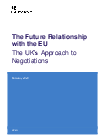Jane Lambert
In my Brexit Briefing for April 2020, I wrote that Monsieur Barnier had come close to accusing British officials of negotiating in bad faith for not discussing commitments that their government had made in the Political Declaration except in the most general terms and by responding to a draft treaty that the Commission had proposed on 18 March 2020 with a number of text proposals which Monsieur Barnier has been asked not to share with the member states or the European Parliament. He was scarcely less critical in his remarks after round 3 of the negotiations on 15 May 2020.
By a letter dated 19 May 2020, Mr David Frost who described himself as our "Sherpa and EU Advisor" addressed some of Monsieur Barnier's concerns. The letter enclosed a 291-page draft Comprehensive Free Trade Agreement ("the CFTA"), a policy document entitled The Future Relationship with the EU, several draft annexes to that agreement and draft agreements on fisheries, air transport, civil aviation safety, energy, social security coordination, civil nuclear energy, law enforcement and judicial cooperation on criminal matters, transfer of unaccompanied asylum-seeking children and readmission of people residing without authorization,
In his letter, Mr Frost agreed to the sharing of the letter and draft agreements with the governments of the remaining member states. He added:
"We are making the texts public as a constructive contribution to the negotiations, and in particular as a response to your suggestions in the last two Rounds that it would help you explain our proposals in more detail to Member States. We are very clear that we are not seeking to negotiate directly with Member States and that it is for you, as the EU’s negotiator, to manage any differences of perspective that may emerge. I hope that today’s publication will facilitate that work and clear up any misunderstandings about the purpose and effect of what we have put to you."The text of the British proposals replicates many of the provisions of the EU's free trade agreements with other countries such as Canada, Japan and South Korea. In Mr Frost's words:
"our legal texts draw on precedent where relevant precedent exists (and we have made pragmatic proposals where it does not, for example on road transport or energy cooperation). So, for example, our draft FTA approximates very closely those the EU has agreed with Canada or Japan. Our draft fisheries agreement is very close to the EU/Norway Agreement. Our aviation proposals are similar to those the EU has agreed with other third countries. Our draft civil nuclear agreement is very close to similar cooperation agreements that Euratom (and indeed the UK) has concluded with other third countries. And so on."The rest of the letter complains of the structure of the 18 March draft:
"Overall, at this moment in negotiations, what is on offer is not a fair free trade relationship between close economic partners, but a relatively low-quality trade agreement coming with unprecedented EU oversight of our laws and institutions"Mr Frost concludes:
"I remain convinced that it would be very straightforward for us to agree a modern and high-quality FTA and other separate agreements, like those you have agreed with other close partners around the world, and that we could do so quickly."The draft CFTA is a substantial document consisting of 34 chapters and the policy document is a detailed explanatory note. Chapter 24 on intellectual property, for example, is 27 pages long. It is a serious negotiating document and a much better offering from the HM government than I had expected. How far or indeed whether. it will appeal to the other side remains to be seen. The point has already been made that the UK economy is bigger than that of most other states with which the EU has made free trade agreements and that it is closer than any of them.
Anyone wishing to discuss this article or any of the topics mentioned in it may message me through my contact form. I will reply by email, phone or video.




